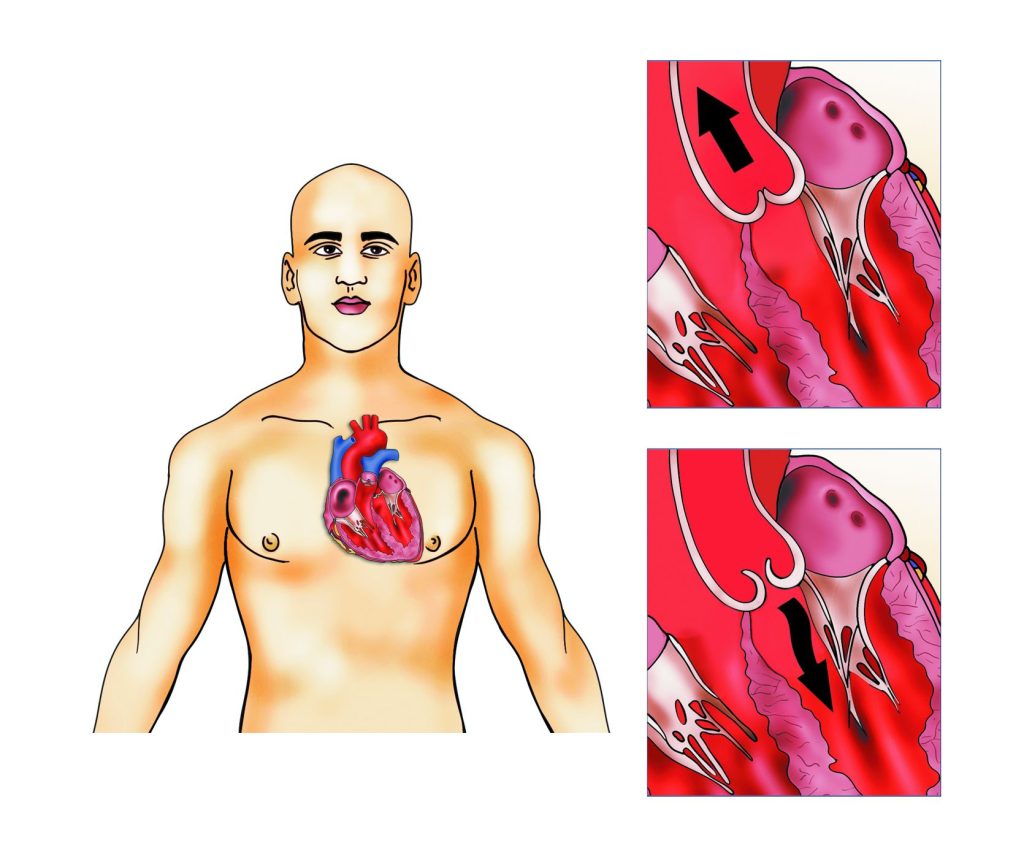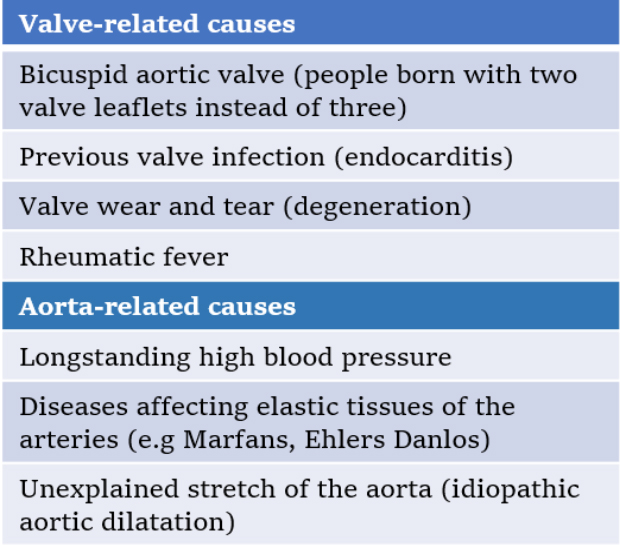
What is the aortic valve?
The aortic valve is the main outlet valve of the heart which allows blood to exit with every heartbeat. It is a one-way valve that closes after the blood has left the heart. It is attached to the main blood vessel that exits the heart, the aorta.
What is aortic regurgitation?
Aortic regurgitation is a condition where the one-way aortic valve doesn’t close tightly and therefore becomes leaky. Blood exits the heart when the heart muscle (left ventricle) pumps. When the heart relaxes, as the valve is leaky, blood is able to leak back into the heart.
The abnormal blood flow results in an abnormal sound when the heart is listened to with a stethoscope, known as a heart murmur. Aortic regurgitation is usually diagnosed following an echocardiogram (echo or cardiac ultrasound).
What causes aortic regurgitation?
There are many reasons the aortic valve can be leaky. It can be due to a problem with the valve (valve-related causes). It can also be due to a problem with the main blood vessel (aorta). If the aorta is stretched then the valve is unable to close properly resulting in a valve leak (aorta-related causes). Some causes are listed below:

What are my treatment options?
Aortic regurgitation is a long term (chronic) condition. It can be graded into three categories; mild, moderate and severe.
Regardless of the severity of aortic regurgitation, if you have no symptoms then it is likely that the Heart Valve Team will keep you under review with a clinic visit and echocardiogram (echo or cardiac ultrasound) on a regular basis. Patients with aortic regurgitation are often followed up for many years without symptoms. Most patients with mild aortic regurgitation will not need follow up.
If the valve is severely leaky (severe aortic regurgitation) and you have symptoms then you may be referred for aortic valve replacement.
Due to the importance of symptoms in patients with aortic regurgitation, you must let your Healthcare Professional know if you develop symptoms in between clinic appointments.
Is aortic regurgitation associated with any other conditions?
Some patients with aortic regurgitation also have abnormalities of the aorta (the main blood vessel leaving the heart). If this is the case, your doctor may advise medication to keep your blood pressure controlled.
What tests will I need?
Most people with aortic regurgitation will have an echocardiogram and ECG. Other tests outlined below may also be performed.
Echocardiogram (Echo or cardiac ultrasound)
During the test an ultrasound probe is placed on the chest and moving pictures of the heart are produced. The test takes around 30 minutes.
Electrocardiogram (ECG)
Stickers are placed on the chest and the electrical activity of the heart is recorded.
Cardiac MRI scan
This is a scan of the heart using a magnet to generate moving video images of the heart. A needle will be inserted into your vein in the arm prior to the test. You lie down in a tunnel for the scan which will take around 30-40 minutes. The scanner is noisy so you will wear ear muffs to protect your ears. The scan may not be suitable for those who are claustrophobic, although measures can be taken to make you feel more comfortable during the test.
Lifestyle matters in aortic regurgitation
62109418
As with any type of heart disease, it is important that you follow a healthy diet, keep your weight within a normal range and do not smoke. Most patients with aortic regurgitation will be encouraged to take regular gentle exercise but you should check this with your doctor. If you have a stretched aorta (the main blood vessel exiting the heart) you are advised to avoid heavy lifting.
If you are planning pregnancy, you should discuss this with your doctor first and let them know immediately if you become pregnant.
All patients will heart valve disease should visit their dentist on a regular basis to ensure good dental hygiene to reduce their risk of heart valve infection (endocarditis).
Symptoms in aortic regurgitation
If you experience any new symptoms in between clinic appointments then it is important that let your Healthcare Professional know.
IMPORTANT SYMPTOMS TO BE AWARE OF:
- Increasing shortness of breath
- Severe or increasing ankle swelling
- Chest pain or tightness
- Rapid or irregular heartbeat (palpitations)
- Difficulty exercising (not being able to do as much for as long)
